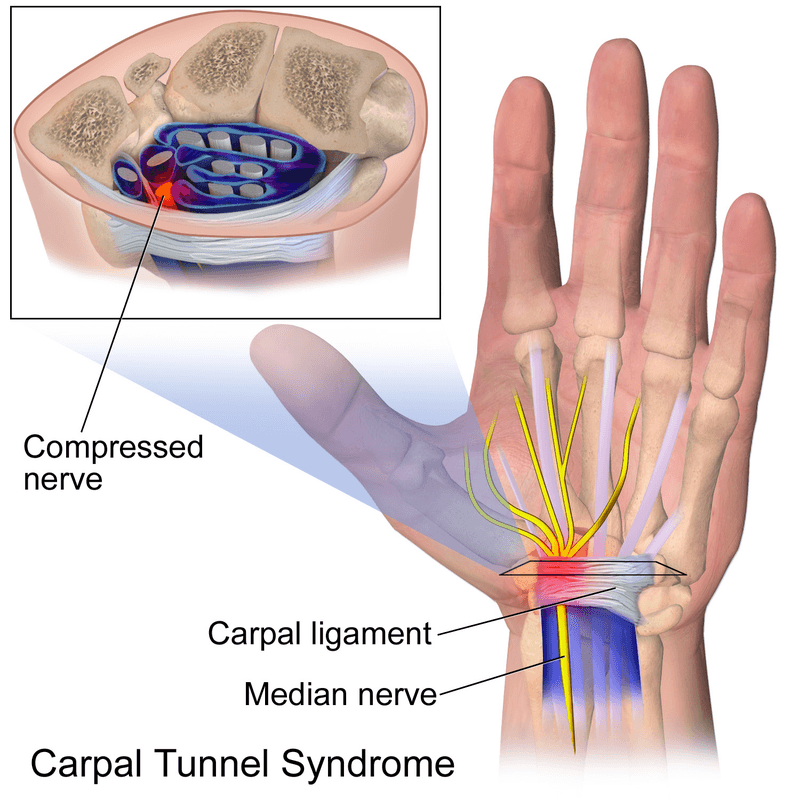Carpal tunnel syndrome is a painful disorder of the hand caused by the entrapment of the median nerve that passes through the carpal tunnel at the wrist. The wrist bones (carpal bones) form the base of the tunnel and strong ligaments (flexor retinaculum) form the roof. The carpal tunnel contains the median nerve, blood vessels, and tendons that pass to and from your hand. Carpal tunnel syndrome occurs when either the space in the tunnel decreases or when the contents enlarge.
What are the causes of carpal tunnel syndrome?
Some common causes and risk factors include:
- Repetitive hand and wrist movements: Performing repetitive motions with the hands and wrists, especially in awkward positions, can contribute to the compression of the median nerve. This is common in activities such as typing, using a computer mouse, or assembly line work.
- Prolonged wrist flexion: Keeping the wrist in a flexed or extended position for extended periods can increase pressure on the median nerve. This can happen during activities like using a computer keyboard or mouse, playing musical instruments, or using tools that vibrate.
- Anatomical factors: Certain anatomical characteristics, such as having a smaller carpal tunnel or a shape that predisposes to compression, can increase the likelihood of developing carpal tunnel syndrome.
- Trauma or injury: A wrist injury or trauma, such as a fracture or sprain, can lead to swelling and inflammation in the carpal tunnel, compressing the median nerve.
- Medical conditions: Certain medical conditions, such as rheumatoid arthritis, diabetes, and thyroid disorders, can increase the risk of carpal tunnel syndrome. Hormonal changes, such as those that occur during pregnancy or menopause, can also contribute.
- Genetics: There may be a genetic predisposition to carpal tunnel syndrome, as some individuals may have a family history of the condition.
- Obesity: Being overweight or obese may increase the risk of developing carpal tunnel syndrome, possibly due to increased pressure on the median nerve.

Who is most at risk for carpal tunnel syndrome?
Women are more commonly affected by carpal tunnel syndrome than men, possibly due to differences in hand anatomy and hormonal factors.
CTS is more prevalent in individuals who are middle-aged or older. As people age, the risk of developing the condition increases.
What are the symptoms of carpal tunnel syndrome?
- Gradual onset of pain, burning, tingling, or numbness in the median nerve pathway (the thumb, index finger, and middle finger)
- Symptoms may be worse at night or early in the morning
- Symptoms may be relieved by shaking or flicking of the hand
- As the condition progresses, there may be numbness, weakness, and muscle wasting of the thumb muscles causing difficulty with pinching, gripping, and frequently dropping things
Can physiotherapy help with Carpal Tunnel Syndrome?
Physiotherapy treatment for carpal tunnel syndrome:
- Education on rest, activity modification, and workplace ergonomics
- Mobilization of the carpal bones and the median nerve
- Therapeutic ultrasound therapy over the carpal tunnel to speed up healing
- Splinting the wrist during sleep
- Exercises to stretch and strengthen forearm and hand muscles, nerve gliding and correction exercises
- Acupuncture
How do I book an appointment with a Physiotherapist near me?
Click HERE to book an appointment with a physiotherapist or chiropractor at one of our eight locations.
- Physiotherapy Etobicoke – Triangle Physiotherapy Etobicoke
- Oakville Physiotherapy Clinic – Triangle Physiotherapy Oakville
- Physiotherapy North York – Triangle Physiotherapy North York
- Mississauga Physiotherapy Clinics – Triangle Physiotherapy Mississauga
- Downtown Physiotherapy Clinics – Triangle Physiotherapy King West
- Uptown Physiotherapy Clinics – Triangle Physiotherapy Lawrence Park
- Physiotherapy Clinic Downtown Toronto – Triangle Physiotherapy Queens Quay
- Physiotherapy Clinics Mississauga – Triangle Physiotherapy Erin Mills
“Managing Carpal Tunnel Syndrome effectively can improve your quality of life, and Triangle Physiotherapy is here to help. We offer expert services across the GTA, including Physiotherapy in Etobicoke, Oakville, North York, Toronto, Lawrence Park, Queens Quay, Erin Mills, Mississauga, and Liberty Village. Our skilled physiotherapists can provide tailored treatment plans to alleviate symptoms and restore function in your hands and wrists.”




